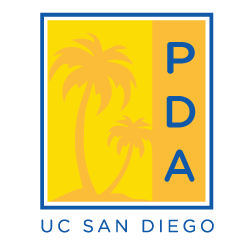
Sheila Semaan, Ph.D.
Associate Product Manager | Biosearch Technologies

- Interview Overview
Interview Overview
Interviews by: Anjana Chandrasekhar
Editing: Alexandra Bortnick
1. Could you please list your previous department at UC San Diego and provide a brief description of the research you conducted?
I worked in the Department of Reproductive Medicine from September 2009 to August 2013. I conceived, directed, and performed research investigating the epigenetic control of sexually differentiated neuronal populations in the brain, as well as research examining developmental gene expression changes during puberty by utilizing numerous mouse models, molecular biology, and histological techniques.
2. Could you describe your current job profile?
I am an Associate Product Manager. I assist in the planning and implementation of product positioning, packaging, pricing, and launch strategies to increase product awareness in targeted markets. I also conduct and analyze reports to understand market demand, customer needs, and competitor trends. I act as primary liaison for interdepartmental communications in discussions related to product management and development. I conduct detailed research and analysis to understand the market, industry, potential applications, and competitor trends for the business area. I identify customer needs and provide input for improvement to processes, new market opportunities and future business development. I monitor product sales and positioning, track product profitability, and competitor activity. I also analyze customers to help establish key accounts and suggest marketing collaboration opportunities and assist in facilitating the development and transition of new product from R&D into production. Draft content for supporting materials and promotions for product line(s). I additionally have a lot of customer contact by fielding customer and technical support inquiries and attending key trade shows and conferences.
3. What made you decide to transition into your current position?
I was finding myself becoming very bored with research and slowly losing interest in my research project. I also realized that working in the lab was only utilizing a small proportion of my skill-set. I had a lot more to give! I am a business woman at heart and needed to be more stimulated with all aspects of a business. My work with the PDA and UCSD Postdoc Career development was also a solidifying factor in helping me decide what I am good at. I was chair of Marketing and Communications and in many respects had to learn about advertising and getting the word out about the many events at UCSD for Postdocs. I also co-founded the UCSD Exposure to Industry program and there I was able to make a lot of connections and learn how to be a better business woman.
4. Apart from the research you conducted, do you feel like anything in particular has helped you to acquire your current position?
The way I got this job was technically because I talk to sales reps all the time. The sales rep did not link me to the company I applied for (I had no connections to this company at all), but she told me about a listserv for people in the life science community who either want to get into sales, marketing, product management, business development, or field support. I got on this listserv and the owner of the listserv sends out jobs one by one. When I saw this job, I basically knew that if they were not interested in me, that there was no hope! But obviously, they did contact me and it all worked out.
5. Could you list some of the most striking similarities and differences between your post-doc and current position?
I write a lot. I do a tiny bit of research. I attend research and development meetings and give feedback on experiments. I edit, a lot! It is also a flexible job, similar to Academia, which is nice. I have do a lot of critical thinking, a lot of excel spreadsheets!
6. Is there any specific challenge (during the entire process of transitioning) that you would like to highlight and if so how did you overcome it?
I have to mention that in my opinion and from my experience applying to positions, that companies in this market will only consider you if you are a PERFECT fit. The jobs I got interviews for at Bio-Rad, Life Tech, Miramar College, and this company that I got the job at, were all because the jobs were a perfect fit for my skill-set. So the saying that “it’s all about the timing” is totally true, albeit annoying to hear. Timing, because, if a job comes up that you are perfect for, then your chances of obtaining the job increase immensely. I also have to say that doing too long of a Postdoc (almost 4 years) was to my detriment for some positions (like Tech Support at Life Tech). But it’s also a catch-22 situation: they won’t hire you if you don’t have industry experience, so then you have to apply to a more 'entry-level job'. But if they feel like you won’t work at the entry level biotech job for too long (because you have a long Postdoc or what-not and they see you as more of a manager), then they also don’t want to hire you!
7. Could you describe your goals and ambitions for the next 5 years?
At my current position, I work a lot with the Business Development people. I am finding this aspect of my work to be very fascinating. So besides continuing to work as a Product Manager, I am hoping to start transition into Business Development in about 5 years.
8. What do you feel you could have done more, as a Postdoc, to help prepare you for or acquire your current position?
I think I did every single thing that I could do to prepare for and acquire my position. I made sure that I was multi-faceted. I didn’t just do research: I was an adjunct professor, I helped others around me trouble-shoot their experiments, I created and ran career development programs, I participated in the planning and execution of large vendor shows, I wrote, I edited, I read. All of these skills are things I need at my current position.
9. What do you feel is the most important advice you can give to a current UCSD Postdoc in order for them to obtain a position such as yours?
Soul-search early, start the search for jobs early, keep applying, and talk to as many people as possible!! Make sure everyone around you knows EXACTLY what you are looking for. Help for a position may come in the strangest of places. In my case, it was a sales rep that led me to be in the right situation to see this job posting. Additionally, and I think this goes without saying, my work with the PDA and UCSD Postdoc Association was also a solidifying factor in obtaining this type of job. Companies, in general, love go-getters. If they see that you are seeing a need for something and filling that need, then that is icing on the cake. Besides networking and knowing lots of people, I think it is also critical to be good to those you work with or have worked with in the past. It’s not just about who you know, but can these people actually vouch for your work ethic and ability to work with others? Keep your network open, keep lines of communication open always. Help others and help yourself in the process. After I finally got this job offer, I have been in the process of emailing every single person I had an informational interview with or any person who I have spoken to who has tried to help me in obtaining a position. I feel like I owe them at least that much!!
